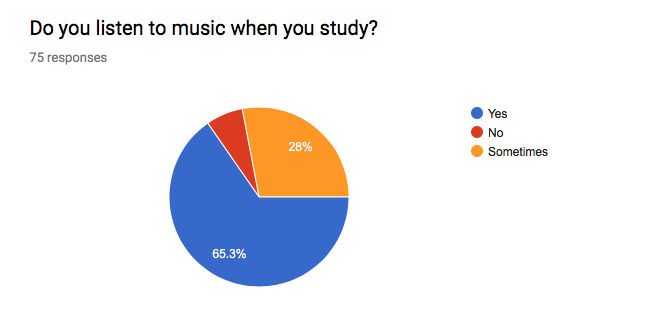In a Tiger Hi-line survey, over half of students listen to music when studying

Out of 75 responses, 65.3% of students said that they listen to music when hey study. About 28% said that they sometimes tune into music when they study.
When CFHS students are tuned in to their studies, an overwhelming majority are simultaneously tuned in to music.
In a survey of 80 students, 94.4 percent said that they listen to music while doing homework, and 83.3 percent said that they think music benefits them while studying, but the question of music’s merits for improving studies is still out.
According to Carolina Kuepper-Tetzel, a professor at the University of Dundee in the UK, music that is soothing and relaxing, usually without lyrics, can help students zone out distractions and focus on their work more. Listening to music during a long study session can also improve endurance and put students in a more positive mood.
According to Kuepper-Tetzel, music is also proven to help reduce anxiety and help with student stress.
“When I’m listening to music I let go of everything and zone in on one thing and it gives me a stress free area where I can ignore all the stress around me and it calms me enough to focus on my work,” junior Jibreel Bailey said.
But not all music can help you study, as music with heavy beats or distracting lyrics can completely take you off of your study path, Kuepper-Tetzel stated.
“I listen to calming music when I study, but if I try to listen to loud music or distracting lyrics, it gets me too pumped up to focus and study,” sophomore Samantha Leeper said
Senior Alice Van Patten said, “It ultimately depends on what you’re listening to. The music should not be so engaging that you get distracted by it, but not so boring that you feel the need to change it every minute. Listening to music can be beneficial while studying by keeping you focused on studying rather than getting distracted by other things happening around you.”
The most common genre of music that is associated with studying is classical music and that is because of the Mozart effect. The Mozart effect is based off a study conducted by Frances Rauscher in 1993 where students had an increase in cognitive ability and response time while listening to a Mozart sonata. This allowed them to not only finish their homework faster, but be more insightful with their work.
Allison Engel, an award winning reporter for the University of Southern Carolina, also supports classical music and its relaxation benefits. “Children who listened to classical music for one hour a day over a six-month period exhibited brain changes that indicated greater levels of relaxation — even when the children were not asked to pay attention to the music.”
Though that doesn’t mean students have to limit themselves to just classical music when trying to improve study habits. Only 13.2 percent of those surveyed said they listened to classical music when they study.
It all comes down to personal preference and what gets one focused on one’s work the best. The type of music that students want to add to their study playlist would be the music where they turn it on and 15 minutes later and realize they haven’t heard any of it. This can be from a wide variety of genres, not just classical. That doesn’t mean all music is perfect for studying though.
Those who find themselves bobbing their heads while banging their pencils on their desks instead of working may not be tuned in to the best songs to listen to while studying. For those who usually listen to rap with strong beats and loud lyrics, R&B might be a good place to look for some study music as it offers similar styles to rap/hip-hop music with more relaxed beats and more soothing lyrics. “I normally listen to rap music but when I study it is too distracting so I listen to R&B instead because it is more calming and it makes it easier for me to focus,” sophomore Carter Svoboda said.
The last thing to look out for is when one finally finish a playlist and gets settled in. Students should put their phones in a place where they can’t access them easily to prevent themselves from constantly changing the song until they get just the right one. Music should not be the key focus when students sit down to study, and if they feel the need to constantly change the song, then the music is doing more harm than good.
“I like listening to music when I study, but if I have to change the song every couple of minutes it snaps me out of my zone and it is more difficult to get my work done,” senior McKenna Holahan said.







You must be logged in to post a comment Login